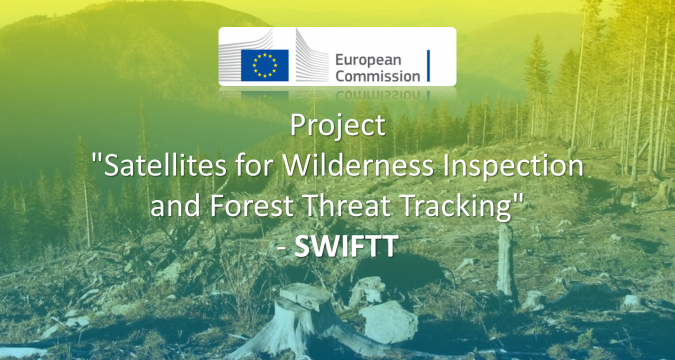ACRONYM: SWIFTT
Title : “Satellites for Wilderness Inspection and Forest Threat Tracking”
Instrument (Call): HORIZON-EUSPA-2021-SPACE-02-51, “EGNSS and Copernicus applications fostering the European Green deal”
9 participants, Organizations from France, Italy, Belgium, Germany, Latvia
Duration: 3 years (2023 – 2025)
Abstract: Forests are essential to life on Earth. They provide habitats for thousands of creatures and combat climate change through carbon sequestration. However, our forests are threatened by insect outbreaks, fires, windthrow and droughts. Notably, insect outbreaks are one of the leading causes of forest loss globally, destroying 85M ha of forest worth €15B annually. At the same time, wildfires destroy 400M ha annually on a global scale, according to the European Space Agency. The wind is also a significant forest disturbance agent and a vital component of the dynamics of temperate forests, found in most of western, northern and central Europe, including France, Germany and most Eastern European countries.
Climate change affects forests, causing insects to breed more frequently and providing more dry fuel for global wildfires. In addition, both the frequency and the severity of large storms causing windthrow can be attributed to climate change. This increases the frequency of insect outbreaks, the length of the fire season and the size of areas affected by fire. Countless habitats are lost, and CO2 sequestered yearly decreases by over 4850M tons.
Our solution, SWIFTT, will provide a scientifically sound and technically feasible way to help monitor and manage forest risks: windthrow, insect outbreaks, and forest fires. SWIFTT will enable forest managers to adapt to climate change with affordable, simple and effective remote sensing tools backed up by powerful machine learning models. Our solution will offer a monthly health monitoring service using Copernicus satellite imagery to detect and map the various risks to which forests and their managers are exposed. Early threat detection aids timely intervention. SWIFTT will be tested in real conditions by several end-users from the forest industry, which include Fürstliches Forstamt, Groupe Coopération Forestière and the Rigas Mezia. We anticipate monitoring and protecting up to 130M ha of global forests by 2030, saving foresters over €468M in monitoring costs and creating XXX direct jobs.
Consortium consists of the next partners
- Consortium Coordinator Wildsense company (France) has already completed the development of web and mobile apps on which various risk maps will be displayed. Wildsense has developed remote sensing models capable of detecting windthrow damage, tree health, and forest volumes.
- Academic research partner: Space Research Institute of the National Academy of Sciences of Ukraine and the State Space Agency of Ukraine represents Ukraine in international space organizations and working groups. It is part of UN-SPIDER which aims at improving actions to reduce disaster risk or support disaster response operations through knowledge sharing and the strengthening of institutions in the use of space technologies.
- Tech Contributor University of Bari Aldo Moro (Italy) has an expertise in on machine learning and artificial intelligence. Its “Knowledge Discovery and Data Engineering” Laboratory is a leading centre of competence for the development of machine learning and artificial intelligence techniques for the analysis of spatial, temporal and spatio-temporal data and data time series.
- Scientific Research Partner Institute for Information Processing (Germany) has expertise in wildfire modelling and is the second partner contributing to the research expertise and will take part in the research and development of the visual signal processing technology.
- Tech Contributor Timbtrack company (Belgium) is the provider of the most advanced tree measurement tool on the market.
- End-users from Germany, France and Latvia will take part in the testing and validation of the forest health monitoring models.
- Dissemination partner Da Vinci Labs (France) is responsible for reconciliation of technological innovation with sustainable development by creating physical spaces allowing all stakeholders (citizens, industrials, researchers, policy makers) to experiment with technologies that can respond to the major societal problems of our era (climate change, biodiversity loss, health, cybersecurity).

